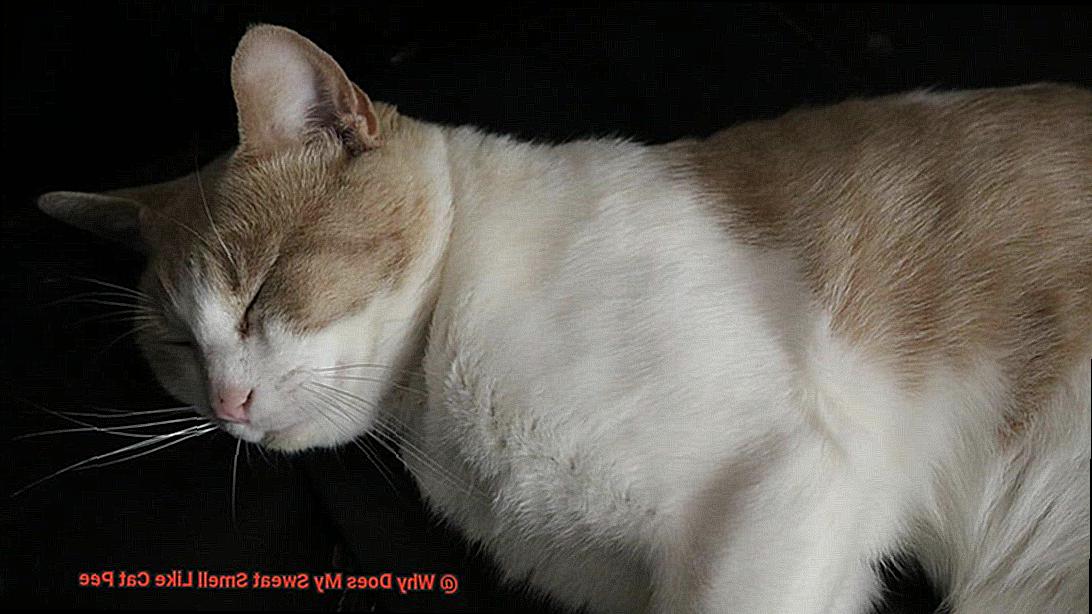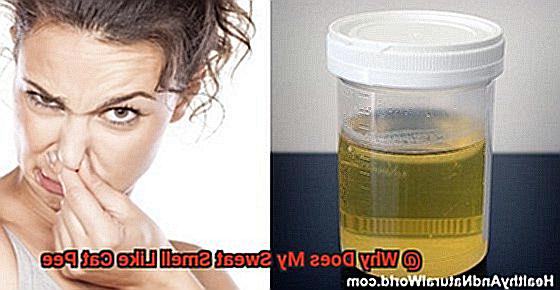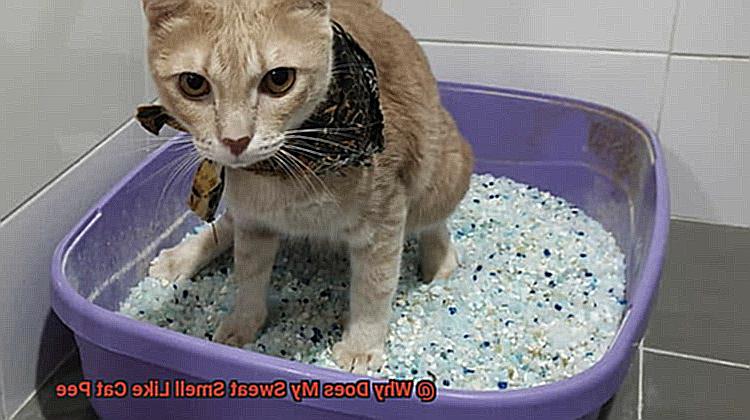Do you ever get self-conscious when your sweat smells like cat pee?
It’s not just you – many people worldwide have experienced this unpleasant odor. But what’s the reason behind it, and how can you prevent it from happening again?
At first, you might mistake it for regular body odor, but upon closer inspection, you realize it’s something different. Whether you’re out with friends, at work, or eating out, having sweat that smells like cat pee is a cause for concern.
Thankfully, we’ve got the answer to this stinky problem. By delving into your diet and examining bacterial growth on your skin, we’ll uncover the root of this fragrance.
So, let’s get started.

What Causes Sweat to Smell Like Cat Pee?
It can be an uncomfortable and embarrassing experience, but rest assured, as an expert on the subject, I’m here to help you understand the possible causes of this unpleasant smell.
One of the most common causes of sweat that smells like cat pee is a high level of bacteria on the skin. When sweat mixes with bacteria on the skin, it can produce an odor that is similar to that of cat urine.
This is particularly true for people who do not shower regularly or who wear tight clothing that does not allow their skin to breathe. Therefore, it’s essential to maintain good hygiene habits and wear comfortable clothing that allows your skin to breathe.
Another possible cause of sweat smelling like cat pee is a medical condition known as trimethylaminuria (TMAU). It’s a rare genetic disorder that causes a strong odor to be released through sweat, breath, and urine.
The odor is often described as fishy or like rotten eggs, but it can also have a cat urine-like smell. If you suspect TMAU may be the culprit behind your sweat’s unpleasant odor, consulting a healthcare professional is recommended.
In some cases, sweat that smells like cat pee may simply be due to diet. Foods like asparagus, garlic, and onions can cause body odor that resembles cat urine.

Additionally, consuming large amounts of protein can cause an increase in the amount of ammonia in the body, which can also produce an odor similar to cat urine. Therefore, making changes to your diet could help alleviate the problem.

It’s important to note that while sweat that smells like cat pee can be unpleasant, it is usually not a cause for concern. However, if the odor persists despite changes in hygiene or diet, it may be worth consulting a healthcare professional to rule out any underlying medical conditions.
Maintaining good hygiene habits, staying hydrated, monitoring your diet, and seeking medical attention when necessary can help alleviate the issue.
Dehydration as a Cause of Sweat Smelling Like Cat Pee
Dehydration reduces the amount of urine and sweat our bodies produce. This leads to more concentrated urine and sweat, which can result in a stronger odor.

Sweat is composed of water, salt, and other minerals. When there’s less water in our sweat due to dehydration, it can lead to a foul odor similar to that of cat urine.
Not exactly the scent you want to give off. However, bad body odor isn’t the only problem that can arise from dehydration.
It can also cause headaches, dizziness, and exhaustion, among other health issues. Therefore, it’s crucial to stay hydrated by drinking plenty of water throughout the day.

Drinking water isn’t the only way to stay hydrated, though. Fruits and vegetables are hydrating foods with high water content that can help keep us hydrated.
On the other hand, caffeine and alcohol should be avoided since they can dehydrate the body. If you’re someone who sweats excessively or has a strong body odor even when you’re not dehydrated, it’s worth consulting a doctor.
They can help identify any underlying medical conditions that may be causing your symptoms. In conclusion, dehydration can cause sweat to smell like cat pee.
If you’re concerned about your sweating or body odor, don’t hesitate to see a doctor.
Foods and Medications that Can Cause Sweat to Smell Like Cat Pee
Well, it turns out that certain foods and beverages can change the odor of our sweat after they’re metabolized by our bodies. Asparagus, garlic, onions, and alcohol are all culprits containing sulfur compounds that are excreted through sweat glands, resulting in a less than desirable scent.
But it’s not just food that can lead to funky smelling sweat – certain medications can also be to blame. Antibiotics like penicillin and cephalexin, while lifesaving in fighting infections, can alter the natural balance of bacteria in our bodies, leading to an unpleasant odor emanating from our pores.
Similarly, some medications used to treat high blood pressure and diabetes can alter the chemical composition of our sweat, resulting in an unusual odor. Now, it’s worth noting that not everyone who consumes these foods or takes these medications will experience the same reaction.
Some may not notice any changes at all while others may have a more noticeable odor. If you suspect that your diet or medication is causing your sweat to smell strange, it’s important to speak with your healthcare provider for further evaluation and advice.
How to Prevent Sweat from Smelling Like Cat Pee
Sweat is a natural process that helps regulate our body temperature and eliminate toxins. However, when it produces an unpleasant odor, it can be uncomfortable and embarrassing. But don’t worry. There are several effective ways to prevent sweat from smelling like cat pee.
Maintain Good Hygiene Habits
The first step to combatting body odor is to establish good hygiene habits. Taking a shower regularly with antibacterial soap can help eliminate bacteria from the skin that causes odor.
Be sure to pay extra attention to areas where sweat tends to accumulate, such as your underarms and groin.
Wearing clean and breathable clothing made of natural fabrics, such as cotton, linen, or hemp, can also reduce sweating and prevent odor.
Use Antiperspirants and Deodorants
Antiperspirants work by blocking sweat glands, while deodorants mask odor by attacking bacteria on the skin. Choose a product that suits your skin type and does not cause irritation.
Apply the product after showering and before going to bed for maximum effectiveness.
Follow a Healthy Diet
Diet plays a crucial role in preventing sweat from smelling like cat pee. Foods such as garlic, onions, and spicy foods can increase body odor. On the other hand, consuming foods high in chlorophyll such as parsley, spinach, and mint can help reduce body odor by neutralizing the toxins in sweat. So opt for healthy snacks like fresh parsley instead of chips.
Practice Relaxation Techniques
Stress and anxiety can lead to excessive sweating and body odor. Practicing relaxation techniques such as meditation, yoga, or deep breathing exercises can help reduce stress levels and prevent excessive sweating. It’s like giving your mind a day at the spa.
Consult a Healthcare Professional
If the problem persists despite following these steps, it is advisable to consult a healthcare professional for further evaluation and treatment options. There may be an underlying medical condition that requires treatment.
So, preventing sweat from smelling like cat pee is possible with the right practices. By maintaining good hygiene habits, using antiperspirants and deodorants, following a healthy diet, practicing relaxation techniques, and seeking medical advice when necessary, you can keep your body smelling fresh and clean. Don’t let the fear of bad odor prevent you from enjoying life.
Proper Hygiene Practices for Reducing Body Odor
Proper hygiene practices can help you combat this issue and boost your self-confidence.
Incorporating the following habits into your daily routine can keep your body smelling fresh and clean. The first step is to shower or bathe daily with warm water and soap.
This will help eliminate sweat and bacteria from your skin, which are the leading causes of body odor. Think of it as washing away the dirt and grime from a long day outside – you don’t want to bring it inside.
After showering, make sure to dry yourself thoroughly, especially in areas where you tend to sweat the most. Use a clean towel each time to avoid reintroducing bacteria onto your skin.
Imagine wiping away any potential “unwanted visitors” from your skin’s surface. To minimize body odor, wearing clean clothes is also crucial.
Change your clothes daily and avoid wearing the same clothing for an extended period, especially if they are sweaty or damp. Opt for breathable fabrics like cotton, which allows air to circulate and helps prevent sweat buildup.
When selecting deodorants and antiperspirants, look for products containing aluminum chloride or zirconium compounds. These ingredients can help reduce sweating by blocking the sweat glands.
However, be mindful not to overuse these products as they can cause skin irritation and even discoloration. Use only what you need.
In addition, paying attention to your diet can also help reduce body odor. Avoid consuming spicy or pungent foods as they can increase sweating and make body odor worse.
Instead, choose a diet rich in fruits and vegetables that contain antioxidants that help eliminate toxins from your body. Think of it as fueling yourself with the right kind of energy to keep you fresh.
Remember to consult a doctor if you experience persistent body odor even after taking these measures as it could indicate an underlying medical condition.
Maintaining Hydration Levels to Avoid Strong Odors
It might surprise you to learn that proper hydration levels play a vital role in keeping bad smells at bay. Dehydration causes urine to become more concentrated, leading to a stronger odor.
But did you know that dehydration also affects sweat glands, resulting in an unpleasant scent when sweating? That’s where maintaining proper hydration levels comes in.
Drinking enough water throughout the day is critical to staying hydrated. While the general guideline is at least 8 cups of water per day, individual needs and activity levels can vary.
It’s important to note that other fluids like tea, coffee, and soda do not count towards hydration goals as they can actually dehydrate the body. Adding fruits and vegetables with high water content to your diet can also help keep your body hydrated.
Watermelon, cucumbers, oranges, and lettuce are all excellent choices that can boost hydration levels. Maintaining proper hydration levels isn’t just about avoiding strong odors in sweat; it’s also essential for overall health and well-being.
Drinking enough water and incorporating high-water content foods into your diet is a simple yet effective way to keep your body hydrated and smelling fresh.
Avoiding Certain Foods and Medications that Can Cause Unpleasant Odors
Garlic, onions, and spicy dishes are some of the main offenders that can cause your sweat to reek. These foods contain high levels of sulfuric compounds that can be released through your sweat glands.
To combat this, try reducing your intake of these items or cutting them out of your diet altogether. Moving on to medications, antibiotics, antidepressants, and blood pressure regulators are just a few examples of drugs that can cause an unpleasant odor in your sweat.
If you notice a change in the smell of your sweat after starting a new medication, it’s important to speak with your healthcare provider. While avoiding these foods and medications may help reduce the unpleasant odor in your sweat, it’s essential to note that there may be underlying factors at play.
Hormonal imbalances or medical conditions could also contribute to the smell. If you continue to experience a strong and persistent odor, it’s recommended that you consult with your healthcare provider for further evaluation and treatment.
In summary, avoiding certain foods and medications is key to reducing the odorous odor in your sweat. Keep yourself hydrated and incorporate high-water content foods into your diet as well.
beO5trT3xhw” >
Conclusion
To sum up, having sweat that smells like cat pee can be a distressing experience.
But don’t worry, it’s not uncommon, and there are many reasons why it might happen. One of the most frequent culprits is an abundance of bacteria on the skin, which can produce an odor akin to feline urine.
Another possible explanation is trimethylaminuria (TMAU), a rare genetic disorder that results in a potent scent that can emanate from breath, sweat, and urine. In addition to these reasons, diet and dehydration can also contribute to sweat smelling like cat pee.
Consuming foods such as garlic, onions, and asparagus or taking certain medications can alter the composition of sweat and result in unpleasant odors. Dehydration decreases the amount of water in our sweat, causing more concentrated urine and sweat with a stronger stench.
Luckily, there are ways to combat this problem. Maintaining good hygiene practices such as washing regularly with antibacterial soap and wearing clean clothes made of breathable fabrics can help eliminate bacteria on the skin.
Antiperspirants and deodorants attack bacteria on the skin while also masking odors. Eating a healthy diet high in fruits and vegetables with high water content helps you stay hydrated while avoiding foods that cause body odor.







